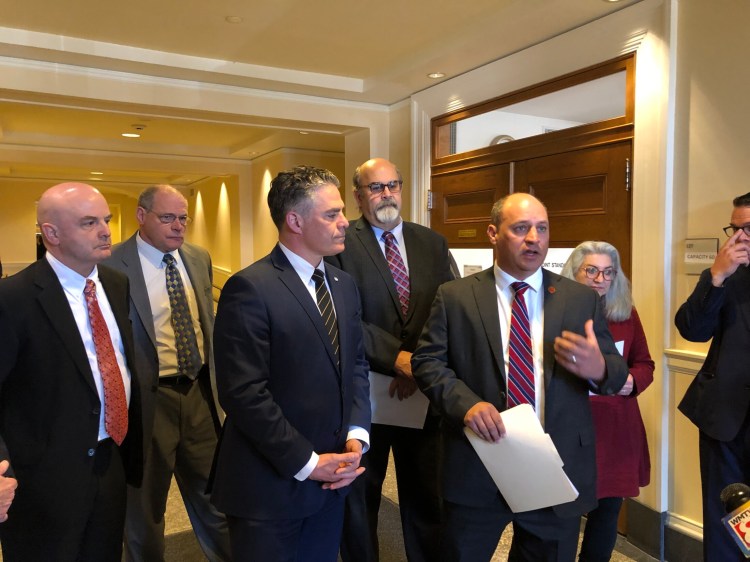AUGUSTA — Municipal officials from around Maine were at the State House on Wednesday urging lawmakers to support legislation that would allow them to create new local sales taxes.
The bills allow for a range of sales tax options, including some that would increase the sales tax on all goods and services, and others that would apply only during Maine’s busy tourism season or only to hospitality services, such as restaurants and hotels.
Portland Mayor Ethan Strimling and Auburn Mayor Jason Levesque said decreases in state revenue sharing have prompted cities to look for new revenue sources so they can avoid increasing property taxes.
But businesses spoke against the proposals, telling members of the Legislature’s Taxation Committee that local option sales taxes create an uneven playing field and would only hurt Maine, which is already one of the highest taxed states.
Strimling said the state has failed to meet its obligation to share 5 percent of the tax revenue it collects with municipalities, and cities need a way to balance local budgets without increasing property taxes or cutting public services that cities provide, not to their own residents, but often those in surrounding communities as well.
“There is just no doubt were this money to come in over the last few years it would have offset the property tax increases,” Strimling said. “We have lost $33 million from the reductions in revenue sharing over the last five years.”
But Lovia Koscinski, with the Maine Campground Owners Association, said aiming a sales tax increase only at tourists would hurt small businesses or prompt would-be visitors to go someplace else, causing Maine to lose revenue in the long run.
“How can we compete if our town passes a local tax option and a town two towns over does not?” Koscinski asked. “Our town may get a new fire truck but it will lose a family business.”
She said tourist can go elsewhere.
“New Hampshire, Canada, Cape Cod,” she said. “At some point, enough will be enough and the tourists may decide a vacation in Vacationland just isn’t worth it.”
Also testifying against local sales taxes was the Maine Center for Economic Policy, a left-leaning think tank that advocates for progressive tax policies; and the Maine Heritage Policy Center, a right-leaning think tank that advocates for tax cuts and free market policies. Representatives from both organizations said sales tax increases hit poor Mainers harder.
Levesque, the Auburn mayor, said he wasn’t necessarily advocating raising local sales taxes, but wants cities and towns to have the option. Levesque, a Republican, and Strimling, a Democrat, said the issue has both bipartisan support and bipartisan opposition.
Levesque urged lawmakers to also honor Maine’s tradition of local control.
“I would really be appreciative if you could put the trust in the people of the individual municipalities to make this decision for themselves,” Levesque said. “The same way you have trusted the people to elect you to the office, so I’m sure you can all agree that their judgment is fairly sound.”
Similar legislation failed to pass last year, but Rep. Mike Sylvester, D-Portland, a sponsor of one of the bills, said he’s making a renewed attempt in an effort to diversify municipal revenue streams.
Sylvester ‘s bill would allow up to a 1 percent sales tax increase on prepared meals and lodging, but 15 percent of the revenue would be redistributed to other cities to be used on the opioid crisis.
For Portland, which has an annual budget of about $360 million, a 1 percent local tax would generate $16 million a year, according to an estimate by the Maine Municipal Association, which represents cities and towns on issues before the Legislature and has made the proposal a top priority. Bangor would be second, taking in $13.7 million, followed by South Portland with $10.6 million, Augusta with $8.3 million and Auburn with $7.6 million.
Maine is among only 12 states that do not allow local sales taxes, according to the Tax Foundation, a nonprofit Washington, D.C.-based tax policy think tank. Maine’s statewide general sales tax of 5.5 percent is also the fifth lowest sales tax rate in the U.S., according to a 2017 Tax Foundation report.
Strimling said a local option tax in Portland could be used to reduce local property taxes by about $500 per home on average based on an average property tax value of $250,000. Levesque said a used to reduce property taxes in his town a local option sales tax of one percent could be used to lower taxes by about $1,000 on an average home valued at $150,000.
All of the bills will be the subject of a committee work session April 3 before they face additional consideration by the full Legislature in the weeks ahead.
Scott Thistle can be contacted at 791-6330 or at:
sthistle@pressherald.com
Twitter: thisdog
Send questions/comments to the editors.




Comments are no longer available on this story